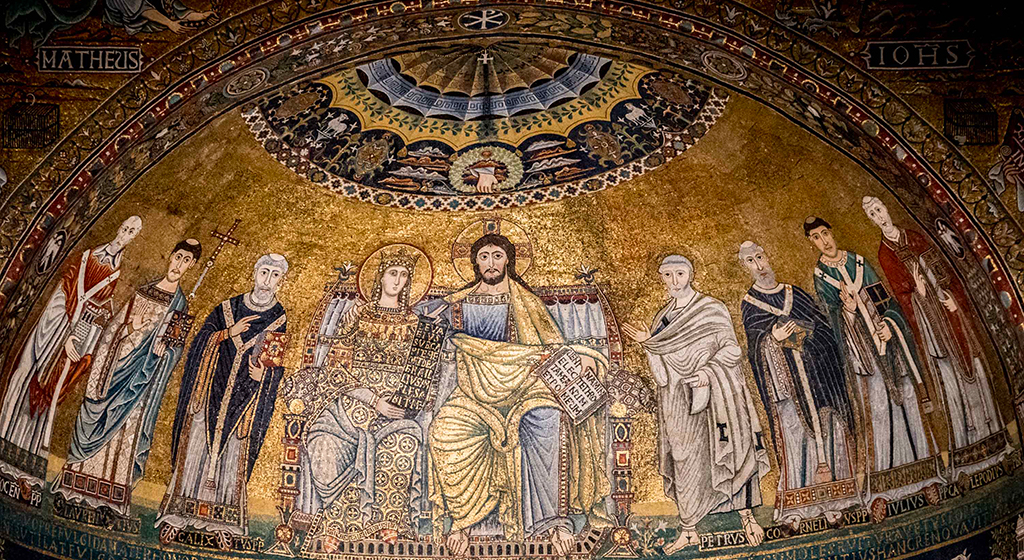Memory of the Church
Memorial of Saint Stephen (+1038), king of Hungary. He was converted to the Gospel and promoted the evangelization of his country.
Reading of the Word of God
Alleluia, alleluia, alleluia
I am the good shepherd,
my sheep listen to my voice,
and they become
one flock and one fold.
.
Alleluia, alleluia, alleluia
Matthew 18,21-19,1
Then Peter went up to him and said, 'Lord, how often must I forgive my brother if he wrongs me? As often as seven times?' Jesus answered, 'Not seven, I tell you, but seventy-seven times. 'And so the kingdom of Heaven may be compared to a king who decided to settle his accounts with his servants. When the reckoning began, they brought him a man who owed ten thousand talents; he had no means of paying, so his master gave orders that he should be sold, together with his wife and children and all his possessions, to meet the debt. At this, the servant threw himself down at his master's feet, with the words, "Be patient with me and I will pay the whole sum." And the servant's master felt so sorry for him that he let him go and cancelled the debt. Now as this servant went out, he happened to meet a fellow-servant who owed him one hundred denarii; and he seized him by the throat and began to throttle him, saying, "Pay what you owe me." His fellow-servant fell at his feet and appealed to him, saying, "Be patient with me and I will pay you." But the other would not agree; on the contrary, he had him thrown into prison till he should pay the debt. His fellow-servants were deeply distressed when they saw what had happened, and they went to their master and reported the whole affair to him. Then the master sent for the man and said to him, "You wicked servant, I cancelled all that debt of yours when you appealed to me. Were you not bound, then, to have pity on your fellow-servant just as I had pity on you?" And in his anger the master handed him over to the torturers till he should pay all his debt. And that is how my heavenly Father will deal with you unless you each forgive your brother from your heart.' Jesus had now finished what he wanted to say, and he left Galilee and came into the territory of Judaea on the far side of the Jordan.
Alleluia, alleluia, alleluia
I give you a new commandment,
that you love one another.
Alleluia, alleluia, alleluia
This Gospel passage reminds us that fraternal correction and forgiveness - which are central features of the life of the Christian community - require great attention and sensitivity. Every believer has the responsibility of correcting his or her brothers or sisters when they make a mistake, just as everyone one of us has the right to be forgiven when we make mistakes. Unfortunately, we are living in a society that is losing sight of the meaning of forgiveness. And this happens because we first lost sight of the debt of mutual love that the Lord asks of us. In a world that is both interdependent and competitive, like the world we live in, we must learn that in order to be truly free and build a dignified society, we need to become slaves of love for each other. Respect for the rights of every man and woman can only come when everyone accepts one, unavoidable responsibility: to respect other people's right to be loved by us. The clearest image of this way of living together is given by the unity of the disciples who pray together. Jesus tells them: "Again, truly I tell you, if two of you agree on earth about anything you ask, it will be done for you by my Father in heaven." Agreement between disciples in asking for the same thing, whatever it might be, compels God to grant it. This means that concord in prayer, agreement in a united will, constitutes an immense power. If our prayers are not answered, we need to ask ourselves how we pray. Perhaps our prayer is spoiled by laziness, a lack of love and concern for the problems and anguishes of the wider community and the world that surrounds us. How many people are waiting for the charity of a prayer that no one grants! With spiritual wisdom, John Paul II talked about how his prayer was linked to "geography," that is, the various places and different situations of suffering about which he had learned. We can do the same.
